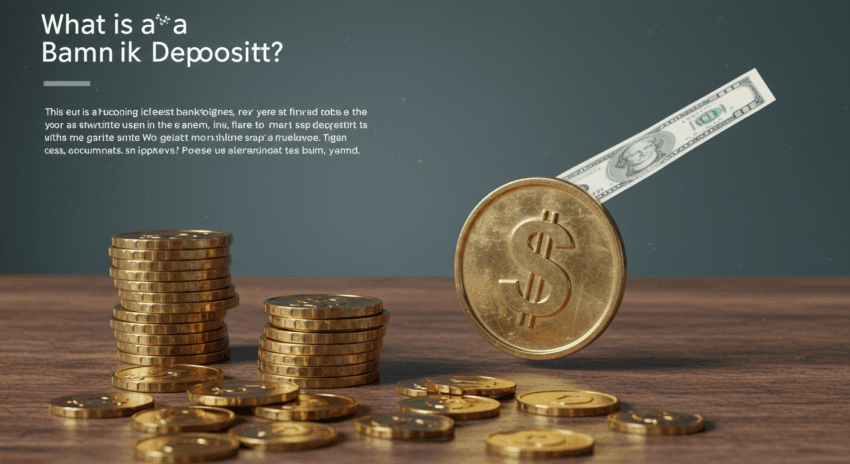What is a Bank Deposit? Your Guide to a Fundamental Financial Tool
Understanding a bank deposit is the first step toward building a solid financial foundation. It is one of the most common and essential interactions you will have with the financial system. While the concept may seem simple—placing your money in a bank—there is a rich landscape of options, benefits, and considerations that can significantly impact your financial health. This article will demystify the world of bank deposits, exploring the different types available, the crucial safety measures that protect your money, and how you can strategically choose the right account to meet your specific goals. Prepare to gain the clarity needed to manage your money with confidence.
The Core Concept: What Exactly is a Bank Deposit?
At its most basic level, a bank deposit is the act of placing funds into an account at a financial institution, such as a bank or credit union. When you do this, you are essentially lending your money to the bank. This transaction creates a legal relationship where you, the depositor, become a creditor, and the bank becomes a debtor. The bank is obligated to return your funds to you upon request, according to the terms of the account agreement.
Why would a bank want your money? Banks use the collected funds from many depositors to issue loans to other customers, such as mortgages, car loans, and business loans. In return for the use of your money, the bank often pays you interest, which is a small percentage of your deposited amount. This arrangement allows the bank to profit from the interest it charges on loans while providing you with a secure place to store your cash and potentially earn a modest return. Bank deposits are generally categorized into two main types: demand deposits, which you can access anytime, and time deposits, which are held for a specific period.
Exploring the Different Types of Bank Deposits
Not all bank accounts are created equal. Each type of deposit account is designed for a different purpose, balancing access to your money (liquidity) with the potential to earn interest. Understanding these differences is key to effective money management.
- Checking Accounts (Current Accounts): These are the most common type of demand deposit. A checking account is designed for daily transactions and offers the highest liquidity. You can easily access your funds using a debit card, writing checks, or making electronic transfers. Because they are built for frequent use, most checking accounts offer very low or no interest. Their primary purpose is convenience and managing day-to-day cash flow, not growing your wealth.
- Savings Accounts: As another form of demand deposit, savings accounts are designed to help you set aside money you do not need for immediate expenses. They are ideal for building an emergency fund or saving for short-term goals like a vacation or a down payment. Savings accounts offer a modest interest rate, allowing your money to grow over time. While the funds are still readily accessible, there might be limits on the number of monthly withdrawals you can make without incurring a fee. Explore more on our Savings page.
- Certificates of Deposit (CDs): A CD is a prime example of a time deposit, also known as a term deposit. When you open a CD, you agree to leave your money in the bank for a fixed period, or term, which can range from a few months to several years. In exchange for this commitment, the bank offers a higher, fixed interest rate compared to a standard savings account. The main trade-off is a lack of liquidity; if you withdraw your money before the term ends, you will likely face a significant penalty. CDs are excellent for goals with a defined timeline where you know you will not need the cash prematurely.
- Money Market Accounts (MMAs): An MMA is a hybrid account that combines features of both savings and checking accounts. They typically offer a higher interest rate than a standard savings account, which is often tied to current market rates. MMAs also provide some checking features, such as a debit card or the ability to write a limited number of checks each month. However, they usually require a higher minimum balance to open the account and avoid monthly fees.

Are Your Bank Deposits Safe? Understanding Deposit Insurance
One of the most significant advantages of using a traditional bank is the security it provides. But what happens if the bank itself fails? This is where deposit insurance comes in. Deposit insurance is a system that protects depositors against the loss of their insured deposits in the event that a financial institution becomes insolvent. In many countries, this insurance is provided by a government-backed agency.
For example, in the United States, the Federal Deposit Insurance Corporation (FDIC) is the entity that provides this protection. It insures deposits up to a specific limit per depositor, per insured bank, for each account ownership category. This means that if your bank were to fail, the government guarantees the return of your money up to that coverage limit. This safety net makes bank deposits one of the safest places to keep your money, providing peace of mind that your hard-earned cash is protected from institutional failure. Before opening an account, always verify that the financial institution is a member of your country’s official deposit insurance program.
How to Choose the Right Bank Deposit for You
Selecting the right account is a personal decision that depends entirely on your financial situation and objectives. Making an informed choice can help you avoid unnecessary fees and maximize your earnings. Follow these steps to determine the best fit for your needs.
- Assess Your Financial Goals: Start by identifying the purpose of the money. Are you managing your monthly bills? You need a checking account. Are you building an emergency fund? A high-yield savings account is a great option. Are you saving for a house down payment you will need in three years? A CD might offer the best return. Matching the account type to your goal is the most critical step.
- Consider Your Need for Liquidity: How quickly and frequently will you need to access the funds? If you need constant access for daily spending, nothing beats the liquidity of a checking account. If you can afford to lock your money away for a higher return, a CD is a superior choice. Your timeline dictates the right balance between access and earnings.
- Compare Interest Rates and Fees: Do not be swayed by a single high interest rate. Investigate the full fee structure. Look for monthly maintenance fees, minimum balance requirements, overdraft charges, and out-of-network ATM fees. Sometimes, an account with a slightly lower interest rate but no fees can be more profitable in the long run. Create a simple comparison to see which of the Financial Products offers the best overall value.
- Verify Deposit Insurance: This is non-negotiable. Ensure that any institution you consider is insured by a recognized government agency. This protection is the fundamental promise of security that makes formal banking so reliable.
Conclusion
A bank deposit is far more than just a place to stash your cash; it is a foundational financial tool that provides security, convenience, and the potential for growth. From the high liquidity of a checking account to the disciplined savings of a Certificate of Deposit, each type serves a unique purpose in your financial journey. By understanding these distinctions, evaluating the safety nets like deposit insurance, and aligning your choice with your personal financial goals, you can make your money work more effectively for you. Take control of your finances by making conscious, informed decisions about where you place your trust—and your deposits.
Frequently Asked Questions (FAQ)
What is the main difference between a savings account and a Certificate of Deposit (CD)?
The primary difference lies in liquidity and interest rates. A savings account offers high liquidity, meaning you can withdraw your funds at any time, but it typically has a lower, variable interest rate. A Certificate of Deposit (CD) requires you to lock your money away for a fixed term (e.g., one year) and offers a higher, fixed interest rate in return. Withdrawing from a CD before its maturity date usually results in a penalty.
Can I lose money in a bank deposit?
It is extremely unlikely to lose money held in an insured bank deposit due to bank failure. Government-backed deposit insurance schemes (like the FDIC in the U.S.) protect your funds up to a specified limit. The primary risk is not loss of principal but rather a loss of purchasing power over time if the interest earned on your deposit does not keep pace with inflation. Your initial capital, however, is considered very safe.
How do banks make money from my deposits?
Banks operate on a business model called fractional-reserve banking. They use the money you and other customers deposit to issue loans to other individuals and businesses. They charge a higher interest rate on these loans than the interest rate they pay you on your deposits. This difference, known as the interest rate spread, is a primary source of a bank’s profit.



